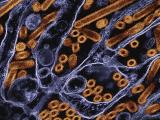Nov 17, 2004 (CIDRAP News) – Clinical trials of a vaccine designed to keep the H5N1 avian influenza virus from sparking a human flu pandemic will begin early in 2005, the head of the National Institute of Allergy and Infectious Diseases (NIAID) said this week.
Under contracts with the NIAID, Aventis Pasteur and Chiron Corp. are each producing 8,000 to 10,000 doses of an H5N1 vaccine based on virus isolated from a human patient who contracted avian flu in Asia this year.
In a wide-ranging Nov 15 press briefing on flu research, NIAID Director Anthony Fauci, MD, said, "Production of pilot lots has begun, we expect them to be finished by the end of December, and we expect clinical trials to begin soon thereafter." He later mentioned January as the month when the trials will probably begin. A recording of the briefing is available on the NIAID Web site.
The vaccine will be tested for safety and immunogenicity, or the ability to trigger production of antibodies, Fauci said. Participants will not be exposed to the H5N1 virus, which has caused 44 human cases with 32 deaths in Asia this year.
Chiron is making pilot lots of H5N1 vaccine in a plant in Liverpool, England, but it's not the same plant where contamination problems doomed nearly half of the US flu vaccine supply this fall, Fauci said. The company was expected to supply up to 48 million doses of seasonal flu vaccine to the United States, but the supply was lost when some lots of the vaccine were found to be contaminated and the whole supply was declared unsafe.
Fauci said Chiron, which is based in California, has asked the British government to inspect the plant where the H5N1 vaccine is being made. "I do know the Chiron people have asked the UK [United Kingdom] regulators to look at the plant to make sure it's OK," he said.
Chiron is also under contract to make pilot doses of a human vaccine for H9N2 avian flu, which infected three people in Hong Kong in 1999 and 2003 and is regarded as another possible source of a human pandemic. Fauci said that vaccine is being made in a plant in Siena, Italy.
Besides making H5N1 vaccine for the clinical trials, Aventis Pasteur has a separate contract to produce 2 million doses of the vaccine. Fauci said the purpose of that contract is to provide vaccine for public health and laboratory workers and to prepare for mass production of the vaccine in case a pandemic erupts.
"It's going to be much easier for Aventis to go from 2 million up to 50 million than it would be if they were stuck at a pilot of 8,000 to 10,000 [doses]," he said.
The H5N1 virus has not yet shown an ability to spread easily from person to person, but many disease experts are worried that it will soon acquire that ability and launch a pandemic. Some experts have said the virus could cause a pandemic on the scale of the Spanish flu of 1918, which killed between 20 million and 50 million people worldwide. Officials have said there is no guarantee that the NIAID's H5N1 vaccine will work if a pandemic occurs.
In response to questions, Fauci said a flu pandemic is probably on the way but not likely to begin in the next few weeks. "If you look at history, it's unlikely that we're going to have massive person-to-person spread in December," he said. "Is it going to happen sometime in the near future? The answer is yes, we're due for it, but you can't predict when it's going to happen."
In other comments, Fauci said he thinks it will be possible, though difficult, to produce a "perennial" flu vaccine—one that doesn't have to be changed each year to match the circulating strains. "I think we can meet the challenge, but it's not going to be easy," he said.
Slight changes occur frequently in flu virus surface proteins (hemagglutinin and neuraminidase) that enable the virus to enter and exit human cells. Because these changes permit the virus to evade detection by the immune system and because current vaccines target these proteins, it is necessary to adjust vaccines each year. Flu experts hope to design a vaccine that would target more stable components of the virus, so that it wouldn't be necessary to change the vaccine every year.
Brian Murphy, an NIAID flu expert who attended the roundtable, sounded less optimistic than Fauci about producing a perennial vaccine. He noted that most people have been exposed to many flu strains over the years, yet they become susceptible to the virus again when the surface proteins change.
"In order for a perennial vaccine to be effective, you have to make something better [at inducing immunity] than repeated infections with wild-type virus," he said. "Somebody who has tried to make vaccines for a long time would find that a very difficult task indeed."
See also:
NIAID video recording of flu research briefing
http://videocast.nih.gov/ram/flu111504.ram



















